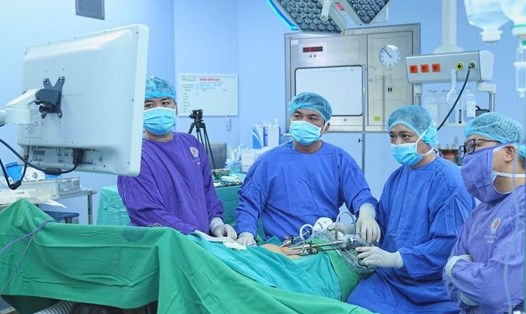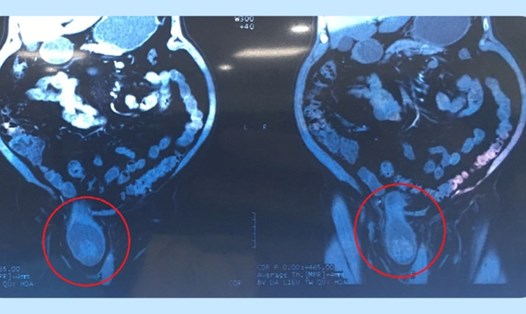One day before being admitted to the Central Hospital for Tropical Diseases, Mr. N.V.D (79 years old in Dong Anh, Hanoi) experienced sharp pain and a bulging mass in the right groin area measuring 5x7cm.
Thinking it would not affect much, the patient bought painkillers to take. But the next morning, the sharp pain gradually increased, unbearable, along with the size of the bulge in the groin area not changing, pressing on the neck of the hernia was painful, could not be pushed up. At this time, the patient was admitted to the hospital with a diagnosis of strangulated inguinal hernia, requiring emergency surgery to save the intestinal loop, not to leave it for too long causing intestinal necrosis.
After more than an hour, the surgery was successful, but part of the ileum had become necrotic and had to be removed because he was admitted to the hospital too late. Mr. D's health is now stable.
Doctor Bui Thanh Tue - Department of General Surgery, Urology and Andrology - said: For patients with new necrosis, the poisoning is not severe, only surgery is needed to remove the necrotic intestine.
Inguinal hernia is the most common type of abdominal hernia, showing a condition where an abdominal organ leaves its position and passes through the inguinal canal into the scrotum. The patient often feels a heavy feeling in the groin area. One side of the scrotum swells into a bulge due to the intestines above. The scrotum gets bigger when the patient walks, runs, does heavy work, or exerts himself; it decreases or disappears completely when the patient rests.
Patients are at very high risk of death if they come too late when they have severe infection and poisoning from the necrotic organ area.
Inguinal hernia is a disease that can only be treated simply and thoroughly by surgery when detected and treated early. However, if complications of strangulated hernia are left too late, there is a risk of necrosis and the herniated organ must be removed. In some cases, it is too late when the patient has a toxic infection due to toxins from the herniated organ returning to the circulation, which can cause septic shock and death if not resuscitated properly.





